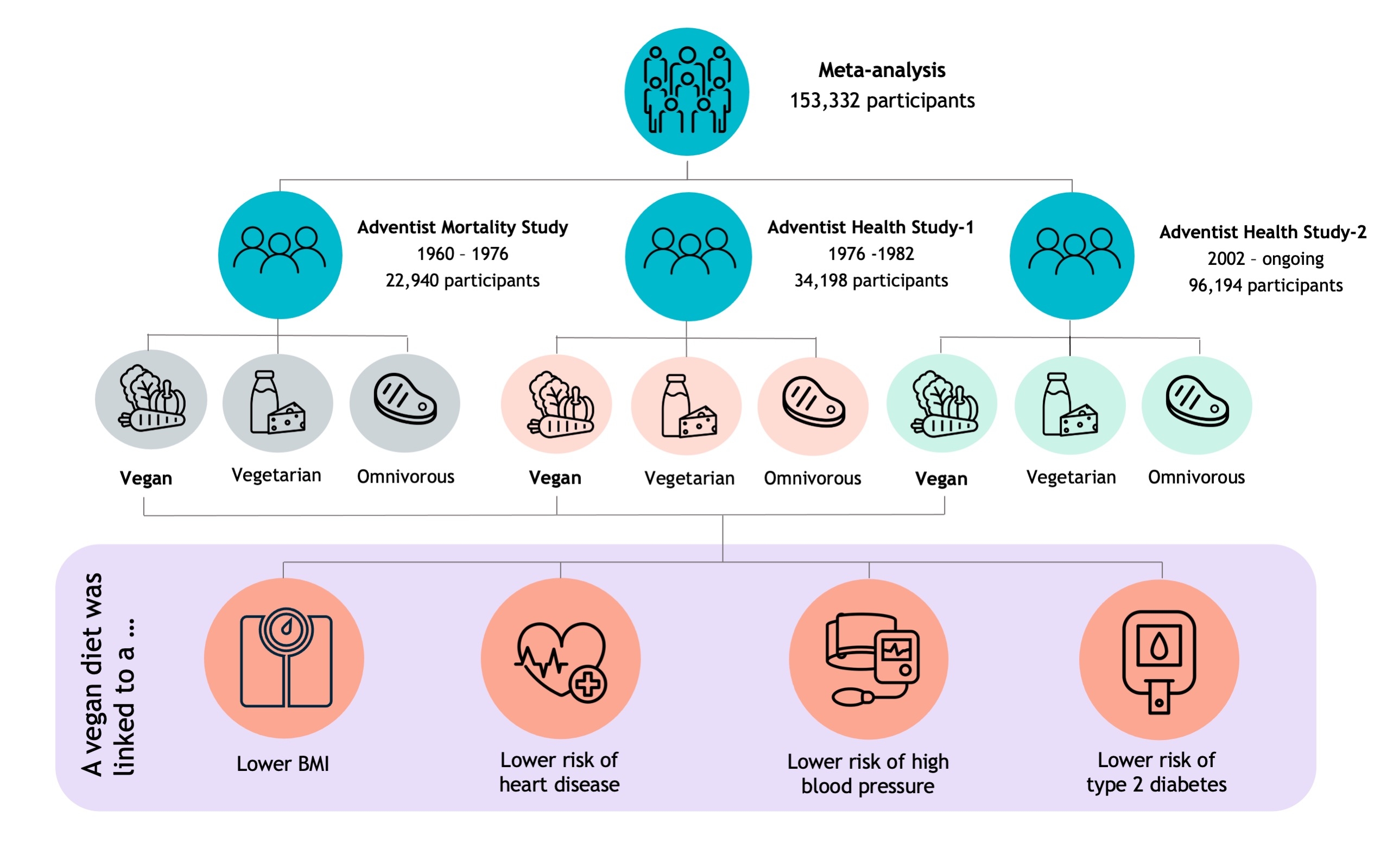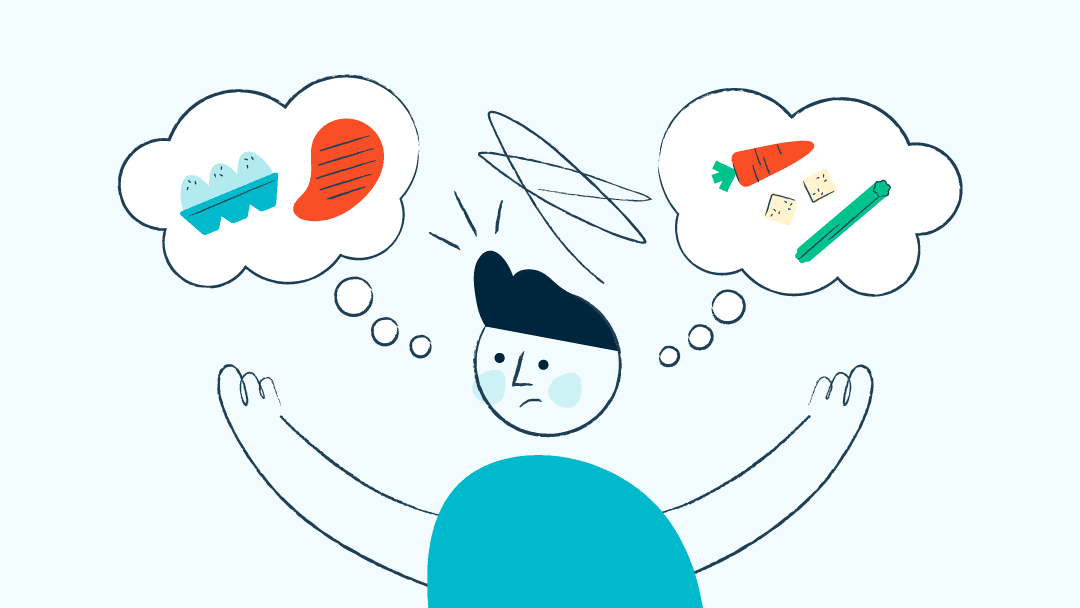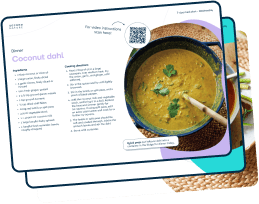‘Veganism’ is growing in popularity, with the number of us trying ‘Veganuary’ at the start of each year increasing. There are many reasons for choosing a vegan diet, including ethical, environmental, and religious influences. Some people suggest health benefits are a reason to go vegan. This guide will look at the evidence to see if this claim is legitimate.
In the past, vegan and vegetarian diets were thought to be lacking in certain nutrients, but studies now suggest that they can provide sufficient nutrition with a little extra effort. Some studies have gone as far as suggesting that a vegan diet can improve our health and reduce the risk of chronic lifestyle diseases.
A lot of the research that people refer to in support of the claim that ‘vegan diets are healthier’ tends to be low-quality, which we’ll discuss in this guide. This means, so far, research hasn’t been able to show that any health benefits are definitely the result of a vegan diet alone.
Medication-assisted weight loss with a future focus
Start with Wegovy or Mounjaro, transition to habit-based health with our support


What is a vegan diet?
Following a vegan diet means your diet doesn’t contain any animal products. This goes beyond a vegetarian diet, which typically contains no meat or fish, to exclude any dairy products such as milk and cheese, as well as items such as eggs and honey.
Research suggests that those who follow a vegan diet tend to eat more fruits and vegetables than any other diets. In fact, one German study found that vegan individuals ate more than four times the amount of vegetables and six times the amount of fruit than the average meat-eater.
Vegan diets have also been found to have a higher intake of carbohydrates. This is because plant-based protein sources, such as beans, lentils, and legumes, often contain carbohydrates. To ensure that a vegan diet contains enough protein, you typically need to consume more carbohydrates than would be necessary for a meat-eater.
Studies have also shown that people following a vegan diet are less likely to smoke or drink alcohol compared with meat-eaters, and are more likely to be physically active.
Key points:
- Vegan diets don’t contain any animal products.
- Vegan diets tend to contain more carbohydrates than other diets.
- People who follow a vegan diet tend to have a healthy lifestyle beyond the food they eat.
Weight management
One of the key measures of health is maintaining a healthy weight. Being overweight or obese is linked to an increased risk of heart disease, high blood pressure, type 2 diabetes and some types of cancer.
Multiple cross-sectional studies (a type of study that analyses data from a subset of the population) have shown that vegans are the least likely group to be overweight or obese. One study that compared the self-reported body mass index (BMI) of vegans, vegetarians and meat-eaters found that 29% of meat-eaters were overweight, compared to just 13% of vegans.
Similarly, a randomised controlled trial that compared the use of different diets for weight loss found that participants following a vegan diet lost, on average, 7.5% of their body weight. Meat-eaters, for comparison, lost an average of 3.1%.
However, as mentioned, vegan diets are typically higher in carbohydrates than other diets. Inside the body, carbohydrates are broken down to produce glucose which travels into our bloodstream and causes blood glucose levels to rise.
Insulin helps to maintain blood glucose levels by allowing glucose to enter our cells. Prolonged high levels of circulating insulin leads to increased fat storage and weight gain.
When we eat a high-carbohydrate diet, the body must release more insulin to take the glucose out of the blood. This means that if we follow a vegan diet, we might find it more challenging to lose weight and manage our blood sugar levels.
Key points:
- People who follow a vegan diet are more likely to have a healthy BMI than people who eat meat.
- Vegan diets may make losing weight and managing blood sugar levels more challenging due to the high carbohydrate intake.
Risk of chronic diseases
Some of the largest studies into the health effects of vegan diets have been carried out amongst populations of Seventh-day Adventists, a religion that encourages a healthy lifestyle. Although vegetarianism is encouraged, in reality Adventists follow a range of diets, some with meat and some without. They typically have a healthy diet and avoid smoking or drinking alcohol.
This makes it possible to better study what effect eating meat has on our health, without other factors influencing the results. It also allows us to compare the effect of a healthy vegan diet compared to a healthy omnivorous diet (a varied diet including meat, fish, and plant-based foods).
A recent meta-analysis combined multiple large scale Adventist studies to create one very large data set with over 150,000 participants. This cross-sectional analysis suggests that vegan and vegetarian diets can provide all our nutritional needs, and could be linked to a lower risk of chronic diseases.
The study followed three groups of Adventists over the course of several years. It found that vegans and vegetarians had a 75% and 55% lower risk of developing high blood pressure respectively. Similarly, they noted a 25% reduction in the risk of developing type 2 diabetes for vegetarians and a 49% reduction for vegans.
Vegans were also found to have a 42% reduction in the overall risk of dying from heart disease. These results could suggest that reducing meat intake has the potential to lower the risk of developing certain chronic conditions.

People who follow vegan diets tend to have a lower intake of saturated fat and cholesterol than people who eat animal products. Some people believe that this could be responsible for the lower risk of heart disease. However, research now challenges the link between saturated fat and heart disease, and shows that our dietary intake of cholesterol doesn’t impact our overall blood cholesterol levels.
However, obesity is a big risk factor for these diseases. Vegan participants had much lower BMIs than meat-eaters in this study. This may mean that the lower risk is linked to their lower weight, rather than a direct result of their vegan diet.
A weakness of this study, however, is that the quality of each diet group wasn’t assessed. Instead, it was assumed that due to the participants’ religious beliefs, both the meat diets and vegetarian or vegan diets would be similarly healthy. However, without direct measurement, there is no way to determine whether this was the case.
Key points:
- Studies have found a possible link between not eating meat or animal products and a lower risk of several chronic diseases.
- The cause of these reduced risks isn’t currently fully understood, but is not necessarily due to avoiding animal products.
Mental health
A cross-sectional observational study found that self-reported stress and anxiety levels were lower for vegans than meat-eaters. It suggested that increased stress and anxiety levels were each linked to a number of factors.
Higher stress levels were, for example, linked to a higher daily intake of sweet foods, reduced social support, going on a diet, and being younger, as well as eating animal products. Similarly, increased anxiety levels were associated with less time spent outdoors, a lower intake of fruit and vegetables, being younger and eating meat.
The researchers propose that these results could be due to the increased intake of fruits and vegetables in a vegan diet, which contain antioxidants and phytochemicals that have been linked to lower levels of oxidative stress and inflammation in the body.
However, with so many factors in play, it’s impossible to determine what effect, if any, the lack of animal products directly had on stress and anxiety levels. So whilst this study could offer some helpful suggestions for reducing stress and anxiety, such as eating lots of fruit and vegetables and spending more time outdoors, it doesn’t conclusively show that eating animal products contributes to feeling more stressed or anxious.
Key points:
- One study found that stress and anxiety levels were lower among vegan individuals.
- There were many factors involved in the study and it is not clear what role a lack of animal products directly had on these differences.
Deficiencies and drawbacks
A vegan diet that has lots of fruits and vegetables, a variety of good sources of protein, and focuses on complex carbohydrates can be very healthy. However, being vegan isn’t for everyone and is certainly not the only way to live a healthy lifestyle. One major drawback is the increased effort required to prevent deficiencies.
Calcium
Most meat-eaters get the majority of their calcium intake from animal products, especially dairy. Without this option, vegan individuals have an increased risk of calcium deficiency. In fact, research has shown that around 70% of vegans aren’t meeting the daily recommendations for calcium intake, which can lead to a loss in bone health. As a result, they’ve been found to have a 30% increased risk of fractures, though this was cancelled out when the recommended intakes were met.
Omega-3
Omega-3 fatty acids are important for maintaining our heart health as well as some brain and eye functions. They’re found in foods such as fish, eggs, and sea vegetables such as seaweed. Since most of these sources are not vegan-friendly, it’s not surprising that vegans, and often vegetarians, tend to have much lower blood concentrations of omega-3 than meat-eaters. Some vegan-friendly foods are fortified with omega-3, and some variations of it can be found naturally in walnuts, flaxseed, hemp seeds, canola oil, and some soy milks.
Vitamin D
Vegans were also found to have the lowest dietary intake of vitamin D, getting just one quarter of the mean intake amongst meat-eaters. Vitamin D can be found in oily fish, red meat, liver, and egg yolks. Again, these foods are not suitable for vegans, so dietary intake would mostly come from fortified foods, such as plant-based milks and breakfast cereals. However, fortified vegan foods use an alternative form of vitamin D that is less biologically available than animal-derived vitamin D. This means it’s not absorbed as well by our body and we need a higher intake to have the same effect. Though it’s recommended that everyone supplements vitamin D in the UK, this might be particularly important for vegan individuals.
Protein
Another component of a balanced diet is protein. Amino acids are the building blocks of proteins and each protein source is made up of a variety of different amino acids that link to form a long chain.
There are roughly 20 amino acids, eight of which are essential for adult humans and must come from our diet. Amino acids are typically lower in abundance in plant-based protein sources, so it is important to ensure that there is a lot of variety in the different protein sources that make up a vegan diet.
Vitamin B12
Vitamin B12 has many important roles in our bodies including helping to make our DNA and red blood cells, and is involved with maintaining our nervous systems. Deficiency is relatively common across the whole population but, research suggests, is more likely in people who follow a vegan diet. This is because vitamin B12 is generally only available from animal sources. Though some fortified foods are available, such as Marmite, supplementation may be necessary.
Iron
Iron is also involved in the production of our red blood cells, which help carry oxygen from our lungs to the rest of the body. Plant based sources of iron contain a different form that is not as easily absorbed by the body. This means, when following a vegan diet, you need a much higher iron intake to meet your daily requirement. Some vegan sources of iron include legumes, tofu and tempeh, nuts and seeds, leafy green vegetables, quinoa, and other whole grains. It can also help to increase how much vitamin C you are getting, for example, by eating more citrus fruits, strawberries, tomatoes, and leafy greens, as this can help to increase how much iron we can absorb.
Iodine
Iodine is essential for thyroid health and maintaining our metabolism. Animal sources include fish, eggs, and dairy products. There are few plant-based sources, but iodine is available to people who follow a vegan diet in seaweed. If you decide to follow a vegan diet, it’s a good idea to add iodised salt to your diet, which is readily available in any supermarket.
Vegan processed food
Another thing to consider is that as vegan diets become more popular, there are more vegan-friendly processed products available in supermarkets and when eating out. These items are not necessarily made healthier by not containing animal products and tend to have similar calories and amounts of carbohydrates and sugar. These products make it easier to be both vegan and unhealthy, and could increase the likelihood of more vegan individuals becoming overweight in the future.
Personal preference
Besides nutritional deficiencies, a vegan diet may simply be too restrictive or undesirable for some individuals. Without truly conclusive evidence of health benefits, it’s more important to find a healthy diet that suits our preferences and that we can maintain in the long term, rather than restricting ourselves from foods we enjoy.
Key points:
- People who follow a vegan diet are more likely to develop deficiencies in their diet than people who eat animal products.
- Processed vegan foods are not necessarily healthier than non-vegan alternatives.
- A vegan diet may be too restrictive or undesirable for some people.
The bigger picture
Most research about vegan diets has been cross-sectional observational studies. Scientists often use observational studies to try and come to conclusions on what is good and bad. These studies observe people over long periods of time and try to understand how different lifestyle factors impact things like their health.
In these studies, there are lots of additional factors that cannot be controlled, beyond whether a person is following a vegan diet or not. For example, how much time we spend outdoors, or how stressful our job is.
These factors can influence our health in ways that cannot be directly measured, making it very difficult to pinpoint the exact cause of any changes. Is it the lack of animal products, or the increased intake of fruit and vegetables, for instance.
Additionally, the majority of research, with the exception of the Seventh-day Adventist meta-analysis, compares the health outcomes of vegan or vegetarian diets with a traditional Western diet. A western diet is high in meat, refined carbohydrates, and processed foods and low in fruits, vegetables, fish, and whole grains. Further research that compares the effects of healthy vegan diets with healthy omnivorous diets is necessary.
Despite the limitations, the research suggests that vegan individuals, on average, lead healthier lifestyles than omnivores. This shows that the attitudes of vegan individuals extend beyond the food they eat, or choose not to eat. Instead, it suggests that they, on the whole, tend to be more health-conscious than the general population.
Rather than helping us to answer the question, ‘Is a vegan diet healthy?’, this opens the door to another possibility. Perhaps health-conscious people choose to follow a vegan diet because they think it’s the healthiest choice.
Ultimately, it could be this combination of lifestyle choices made by health-conscious people, including following a vegan diet, that contribute to the reported health benefits.
Key points:
- The research that suggests vegan diets may be healthier is weak.
- Most research has been cross-sectional observational studies which means it is hard to pinpoint the cause of any differences between groups.
Take home message
- Currently, research doesn’t conclusively show that a vegan diet alone results in better health outcomes.
- A vegan diet isn’t necessarily healthy, though it can be a healthy choice due to the increased focus on fruit and vegetables, fibre, and whole grains.
- Studies do suggest that a vegan diet could be linked to a reduced risk of developing a number of chronic conditions including type 2 diabetes, high blood pressure, and heart disease.
- But, so far, research has not been able to pinpoint a lack of animal products as the exact cause of these results.
- If you do choose to follow a vegan diet it’s important to make sure that you are getting enough calcium, vitamin D, and vitamin B12.
- If going vegan feels too extreme, increasing your fruit and vegetable intake and reducing your intake of processed foods could help to improve your mental and physical health.


